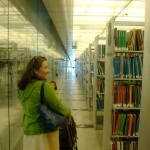
Here’s a paradox to consider. I’ve got a lot to think about, so you’ll have to look past the academic scaffolding.
First premise: There are very few traces of my dad on the Internet.
You can Google “Taku Nimura,” or “Taku Frank Nimura,” and there isn’t very much connected to him, or who he was. I have active e-mail accounts, a Facebook account, a Twitter account, a SheWrites.com page… and as a new daughter of this digital age, it makes me sad that you can’t Google my dad*, for lack of a better term. You can’t find his obituary, the most stripped-down version of a life outline (except for the tombstone inscription), in online newspaper archives.
(Maybe I will create a Wikipedia page about him, but there’s still so much that I need to know. And one wonders: if what makes someone “historic” is debatable, what makes someone Wikipedia-page-worthy?)
And so I wonder about the countless individuals who do not have an online presence, even now; I wonder about the connection between the Internet and identity. I’m not saying that Google should be the only way to find out information, but it’s the first stop for so many, for so much. I wonder about the impact technology will have on my daughters, and the impact it’s had so far. I wonder about them finding out more about their grandfather, in an age where they can’t find him, through search engines that mark their findings in fractions of a second.
Second premise: And yet, Internet technology gave me these things:
1. Pictures I’d never seen before of my dad, from a long-lost friend of his on Facebook. “Are those his granddaughters I’m looking at in your profile picture?” she asks. And that’s a relationship I had not yet connected with my father: he would be a grandfather, my daughters would be his granddaughters.
2. A blog comment here, from someone who knew my dad—during a time when I know so little about his life. I’m not sure we would have found each other without the Internet. I’m so excited to find out more.
I can’t believe it’s taken me so long to realize this next thought, and my ten-year-old self would have resisted this, I’m sure. But here goes: my dad never belonged just to me, or just to my family. He also ventolin usa belonged to his friends, and other communities I’d never known or seen. The memoir that my sister and I are writing, then, may not be just a “dual” or “triple” memoir; it may also be something like a community memoir. I want to ask more people what they remember about him.
3. His Masters thesis in Public Administration and a bibliography that he wrote about Japanese in the United States. (Coming soon from Interlibrary loan, more Internet: cross your fingers!)
4. And this page from the California State Sacramento Library catalog, which makes me so happy. Taking my cue from my wonderful university reference librarians, I know that Google does not see everything. There is, however, a great deal of less-Google-able information, available from libraries.
5. A bookstore in Sacramento selling a poetry anthology; one of the poets is my dad.
Last part of the paradox: what does it mean?
Perhaps more obviously, search engines can erase (or obscure) an identity, but it can also restore an identity, in completely unexpected ways.
In the project I want to think more about what that means about humanity’s urges to record, document, remember. Google might not get me a quick answer about my dad, and I’m not sure I want it to do that, anyway. But I can still find him—or fractions of him—through these vast oceans of time and memory.
Despite our rapid technological changes, I think he would have loved our here and now. He wrote so many letters to friends and family. (My first copyediting job, by the way: proofreading those typewritten letters.) I think he’d have an active Facebook account, to share pictures of his granddaughters. And I can almost see him writing witty status updates. Like me, I think he’d share anecdotes about his family, menus of evening dinners, pictures from his travels.
Librarians, writers, readers: our human urge is to connect.
In the book I’ll be writing more about each of these artifacts. For now, I’m remembering that writing the book is one way to put my father’s presence back in the world.
The paradox rephrased: I’m writing both through, and despite, a technology and history that might otherwise erase my father.
*The dystopic novel I’m reading right now–set in the “not so distant future” describes such a person as “ITP” (Impossible To Preserve).
This picture says a lot about where, how, and why I’m traveling, taken at the Seattle Central Public Library:

